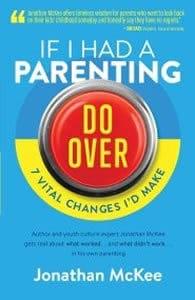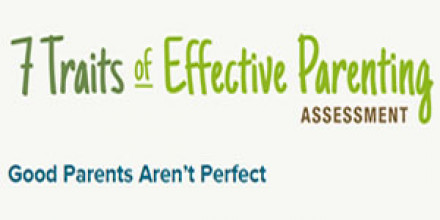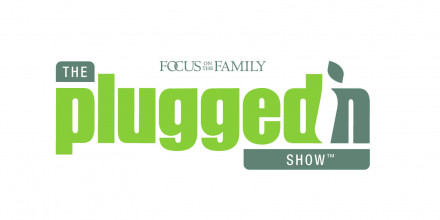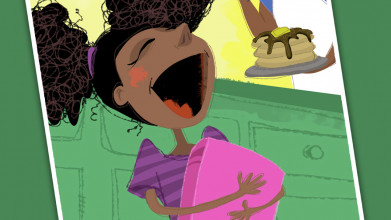
Homemade Meals for Busy Families
Mary Beth Lagerborg, co-creator of Once-A-Month-Cooking, discusses the importance of hospitality and how families can prioritize dinner time by cooking a month’s worth of healthy meals in one session.
Home » Episodes » Focus on the Family Broadcast » Balancing Bonding and Boundaries as a Parent
Teaser:
Mr. Jonathan McKee: And as we bond with our kids and hang out with our kids and they get to know us, they’re gonna glean so much from us. They’re gonna glean so many values that sometimes that rule of go to bed at this time or you know, can’t download this app, well that isn’t gonna teach them.
End of Teaser
John Fuller: Jonathan McKee joins us today on “Focus on the Family.” I’m John Fuller and your host is Focus president and author, Jim Daly.
Jim Daly: All right, John, have you ever done something that you weren’t really sure about and thought to yourself, “Man, I wish I could do a ‘do-over?’”
John: Pretty much every day of my life these days it seems.
Jim: Come on. That’s too hard on yourself.
John: I mean, I yell at the kids. I say something to somebody. I mean, it’s not like I’ve blown it totally today, but (Laughter) there are moments today I’d like to relive.
Jim: I think all of us have had that situation, maybe several times a day, maybe every once in a while, but when it comes to parenting, I think a lot of us, if we’re honest, we would want to do a do-over here or there.
I just had it last night, man. Trent spilled a drink in my car and I was not happy. I had to slip a note under the door saying, “I’m so sorry I loved my interior of my car more than you last night. So, please forgive me for not being the happiest person when you spilt your Coke in my car.”
John: It’s okay. You can let it out there.
Jim: Yeah, thanks for the therapy.
John: Safe place.
Jim: But (Laughter) that would’ve been a little chance for a do-over. But today we want to talk about that when it comes to parents wanting a do-over, for those of us that are still in that role. Let’s hear from someone who’s been through it and can point the way to those moments when maybe you can get it right the first time.
John: Yeah and our guest today is gonna help us learn how to do battle well and get through it all. Jonathan McKee is with us. He is very candid about his share of parenting flubs, as he calls them and he wants to help us and I’m saying “us,” ’cause I’m here. (Laughter) I need this content so much (Chuckling), Jim.
Jim: I’m glad you’re sayin’ this, John.
John: He wants to help us learn to become better and wiser as we help our kids become adults. He’s got over 20 years of youth ministry experience. Jonathan speaks to parents and leaders and teens worldwide. And he and his wife, Lori have three adult children.
Jim: Jonathan, welcome back to “Focus.”
Jonathan: Ah, so glad to be here.
Jim: Okay, we gotta start with the question. What’s the biggest do-over you would want to have?
Jonathan: Oh, man, you know, I think for me and there are so many. (Laughing) I’m right there with you, hearing you guys talk (Laughter) about this. But it’s probably much like incidents like you say, that you know, somethin’ dumb like a spill or a whatever where I just, you know, let my temper get the best of me and I remember moments like that.
Jim: I know. Well, let me ask you this, because some of that is born out of our family of origin. I mean, that’s what you learn as a child from your parents’ parenting capability. We bring a lot of that into our parenting, don’t we? And even to the point where your kids someday will say to you, “You’re just like grandpa.” Or “You’re just like grandma.” And you go, cringe.
Jonathan: Well, I mean, we can teach what we know, but we can only reproduce who we are. And so, I mean, as parents, I mean, we could, you know, have all kinds of rules and all kinds of stuff, but inevitably, they’re gonna be watching us and that’s the scary thing. we handle situations a certain way with inappropriate [means], that’s probably how they’re gonna handle those situations.
Jim: So, in your speaking and talking to thousands of parents about their flubs, as you call them, what’s the most common flub?
Jonathan: Well, you know, this is one of those things where I started to hear the same thing over and over again, because as I was asking parents, like at my workshops and I started to hear the same thing, where a lot of parents were kinda saying, “Man, I wish I would’ve done this.”
And I think the interesting thing to me was, we don’t have a lot of venues where parents can share this. I mean, think about it. There [are] not a lot of places where parents just get together and go, “Hey, I messed up the other day.” It’s kind of embarrassing. Sometimes it’s private stuff. You don’t want to talk about how you, you know, lost your temper and started yelling at your kid or whatever it is you did.
So, I found when I saw these venues, like you’d get at a church where also they’d have like a gathering of parents for a Sunday school class and you have like a panel of parents up on stage sharing some of this stuff, I noticed that parents were like, I mean, pens were out. They were takin’ notes, because whenever a parent says, “I wish if I had a chance to do it over again, I would do this,” man, everybody’s paying full attention.
So when I saw this and noticed it, man, this is good information. What if we harnessed a bunch of the information? So, I started asking parents and I asked literally hundreds of parents, personally at parent workshop[s], did posts to my readers and stuff. I said, “Come on; share. What is it? If you could do one thing over again, what would you do over?”
And the answers started to come in and overwhelmingly the No. 1 answer in however they worded it came out something like, “I wish I would’ve spent more time with my kids.”
Jim: More time.
Jonathan: I wish I would’ve hung out with my kid. Wish I would’ve put my kid to bed more and actually, instead of saying, “Good night!” from downstairs. You know, I wish I would’ve actually showed up at their stuff more. I wish I would’ve, you know, instead of watching them play in the ocean from the sand, I wish I would’ve gone in the ocean with them. Over and over again, that was the overwhelming answer by far. Nothing came close.
Jim: Well, that’s the end of the program then, Johnathan. (Laughter) I mean, we know what to do, spend more time.
Jonathan: Yeah.
Jim: You talked in your book about bonding and boundaries and you’re alluding to that right now, but I love that common word phrase, ’cause that helps keep it simple for me as a dad—bonding and boundaries. What’s the conflict and what do we do with it?
Jonathan: Yeah, yeah, I mean, they’re both very important elements in parenting and in any parenting relationship. A lot of us obviously who have boundaries for the kids—they’re important; that’s when we tell ’em, you know, “Hey, you know, you need to go to bed at this time” or “Sorry, no phone in the bedroom” or whatever those rules are—but bonding is that time where we’re hanging out with our kids. We’re talkin’ with our kids. We’re laughing over pizza, you know, and that kind of stuff.
And both these are very important, but it’s funny. If you think about it and most parents even listening, they immediately start kinda thinkin’ and most of us gravitate towards one or the other a little ore, you know. Some of us are just better at the hanging out, not so good at the, you know, imposing any boundaries. Some of us, we’re kinda, we tend to gravitate more towards the boundaries.
And my point in that chapter in talking about that is, that I think we should tip the scales towards the bonding. And don’t get me wrong. I’m not saying don’t have boundaries. (Chuckling) I’m not saying let kids do whatever they want. I’m just saying, if you, you know, me personally for example, I let my boundaries hinder my bonding, because when I would walk in a room, it was very much, I was the parole officer. I was like, “Hey, feet off the couch.” You know, “What are you doin’? What are you watchin’?” And you could just even see it, the expression on their faces as they’re kinda, “Uh-oh, what am I doing wrong?”
And I think the thing that a lot of parents aren’t thinkin’ about is, you know, if mom and dad don’t have a relationship with their kids, then most likely they’re gonna glean values from other sources and that’s scary.
Jim: Well, let me tease that out a little bit, because I think so often the Lord draws opposites together, not always and I know we’re gonna hear from somebody, John who says, “My husband and I are very similar.” I get that. [The] 80-20 rule would probably apply here where you’re opposites. It’s certainly true of Jean and I. And a boundary parent doesn’t look too kindly on a bonding parent (Laughter) and vice versa.
Jonathan: Yeah.
Jim: You know, a bonding parent has a problem with boundary parenting. How do you talk that through, you know, when you put your head on the pillow at night and you guys are strugglin’ with somethin’ and you’re all about bonding? Well, you’re all about boundaries.
Jonathan: Yeah, and it would be difficult, too because I’m sure that the boundary parent would be like, “You know, you’re always the good guy, ’cause you always just get to hang out, have fun,” you know, and this kind of stuff.
John: You just want the fun, yeah.
Jonathan: And that’s why both parents need to be on board with this, you know, because both parents need to kinda understand that both are important. And you’re right, some people gravitate towards one or the other, but I would go as far as to even tell that boundary parent that if that’s all you are, you might to even go on a boundaries’ fast.
Jim: Well, let me ask you this, too though. Who gets to assess whether that’s all you are? The child or you, the boundary parent?
Jonathan: Well, I always ask parents. I say, “Think about it.” I mean, our listeners right now are probably thinkin’, you know, which one are you? And I ask them, I say, “Which one would your kids say you are? Forget what you say you are. Which one would your kids say you are?
Jim: Well, that’s the point.
Jonathan: Yeah, exactly.
Jim: I think if you ask your kids, they’ll tell ya.
Jonathan: Yeah and you know what? That’s a good discussion to have.
Jim: Of course, then the parent says, “Well, that’s not accurate.” (Laughter)
Jonathan: Yeah, yeah.
Jim: Then you start arguing with the child.
Jonathan: Well, and the thing is, as we start thinking about this, I think parents sometimes thing, okay, boundaries are where I’m gonna teach my kids, because if I can regiment some of these disciplines in their lives, that’s where they’re gonna learn.
And my point is just to kinda raise awareness that, you know, so much of what our kids are gonna learn is because when they’re hanging out with us, they’re gonna see how we treat that waitress, how we treat, you know, how we react in anger, how we do this. And as we bond with our kids and hang out with our kids and they get to know us, they’re gonna glean so much from us. They’re gonna glean so many values that sometimes that rule of, go to bed at this time or you know, can’t download this app, well that isn’t gonna teach them.
Jim: Let me throw you this one.
Jonathan: All right.
Jim: Is God a boundary God or a bonding God?
Jonathan: Well, we’re lookin’ at the God who looked down at us on earth and decided Himself to come down, become flesh, you know, God incarnate and dwell among us. He walked and rubbed shoulders with us and I mean, He was out there connecting with people.
And when He met with the most hideous of sinners, His reaction wasn’t a bunch of rules. His reaction was to have a conversation with them. And He wasn’t okay with their sin, but He was okay to say, “Hey, I don’t care where you’ve been. I care where you’re going.”
And that relational God who wants a relationship with us, you know, all through the Scripture we see that love is this resounding theme that you know, we can know everything and prophesy and this and that, but if we don’t have love, we’ve got nothing. So, relationships are obviously of a very high value.
Jim: Well, and I think when you look at it that way, I think bonding is what provides healthy boundaries and respect for those boundaries. I think it was Josh McDowell who said, you know, rules without relationship lead to rebellion.
Jonathan: Yeah.
Jim: And that’s a beautiful way to say that. I’ll say it again, in case you want to write it down when you’re listening there, but rules without relationship lead to rebellion. And it so true, isn’t it?
Jonathan: Well, absolutely and before people start calling in and complaining, you know, I am not saying, you know, don’t have any rules whatsoever. As a matter of fact, you know, if you get later in the book, you’ll sit there and see where I start talkin’ about, hey, what’s it like to have a social media presence in your kids’ lives and stuff.
And some kids will even say, “Whoa, wait a second, you know. Turning off my phone at night? You know, I can Instagram if you have Instagram with me and all my friends.” You know, I’m very for being in your kids’ lives and being a part of this and having boundaries. My point on the bonding and boundaries is simply let’s tip the scale toward bonding.
John: Well, Jonathan McKee is our guest today on “Focus on the Family” and it’s a pleasure to have him back to talk about his book, If I Had a Parenting Do-Over: 7 Vital Changes I’d Make and we’ve got copies for you at www.focusonthefamily.com/radio.
And Jonathan, my experience has been that I’m a boundaries guy. I’ve learned to let go and to really try to dial into the bonding aspects, the relationships aspects, but age has something to do with this, as well, doesn’t it?
Jim: The parent’s age or the kid’s age?
John: Well, I’m thinkin’ the kid’s age, so you know, 2, 3, 4, there a lot of external rules because so much of life has to be learned. When they hit the teens, you gotta kinda let go, but it’s harder to find a commonality. I mean, “You want to play a board game tonight.” “No.” So, you know, finding the relational time and activity is kinda hard for us.
Jonathan: Yeah, that was our conversation last time I was on this show, talking about finding these venues to connect, especially with kids that can’t pry their eyes from their mobile devices. That is tough.
But it is interesting how we, as parents, especially as our kids get older, when I ask parents, empty nesters, parents with kids that were seniors and juniors, by far the one regret they had was not having as much of that hang-out time.
As a matter of fact, less than 2 percent of people that responded actually said somethin’ like, “I wish I had more boundaries, less than 2 percent. The majority of them were like, “I shoulda hung out more.” So that’s where I’m a big advocate of saying, look for these venues.
John: So, you’re saying it’s not really a matter of the child’s age. Go for relationship as much as possible.
Jonathan: Well, absolutely and this is much easier when you’ve got a 6- and a 8-year-old, ’cause you’re your kids’ hero and they’re like, “Yay! Hang out with daddy!” You know, but (Laughter) when you’re 16 and 18, it is like, “Whatever,” you know. (Laughter) And that’s where we’ve gotta look for those moments. I mean, that’s what I wrote that book all about, but you know, all those different ways to connect with your smartphone-obsessed kid. We’ve gotta look for those moments because they occur day to day and sometimes that family dinner time, you know, where you’re saying, “No tech at the table” and that’s a time where literally dad doesn’t have his phone. And you know, if we can look for those venues where those kinds of connections occur, we need to maximize them.
Jim: Well, and another thing that I liked in your book, If I Had a Parenting Do-Over: 7 Vital Changes I’d Make was to say yes as often as you can. Someone that used to here at Focus, Clark Miller, used to say that often. Say yes. That was his parenting do-over.
Jonathan: Well and that’s one of those things that’s kind of a look back for me with my older kids. I remember honestly embarrassing times where, you know, “Hey, dad, you want to play X-box? And me kind of saying, “Hey, I’m busy.” And by the time I got to my youngest and sadly, it really was by the time I got to my youngest, I remember just making an oath to myself, “I don’t care how busy you are, Jonathan,” you know, ’cause my other were out of the house.
I’m like if my youngest, who is now a junior, comes up and there was times I remember a stack on my desk to the ceiling, you know, an in-box so full and I had to leave the next day and all this different stuff and my daughter comin’ up and askin’, you know, “Hey, you want to go to lunch?” And the only natural answer would be, “I just absolutely don’t have time.” I had made an oath and I was like, “Yes.”
And I share experiences like that in the book where I just remember saying yes on a day where I didn’t have time and lookin’ back and goin’, “Wow, that was one of those amazing moments. It was because of saying yes.
Jim: Well, yeah and as a parent of teens, you talked about the coat incident of 2012. (Laughter) Let’s get right to it.
John: I love that a parenting re-do moment is actually worthy of a title.
Jim: Yes, I like that.
Jonathan: Well, well and that’s in my chapter that I called “Let It Go,” because see one thing you mentioned, John about the age is, you know, not only do they not want to hang out with us as much, you know, as our kids, you know, grow into adolescence and become teenagers, you know, they are just vying for independence, you know. And the thing that’s so hard as parents, no matter what we do, very often, you know, we can walk in and say, you know, “Oh, it’s a beautiful day.” “Well, actually not really. I’ve had better.” You know, they want to just argue with everything you say, you know. And you’re like, “What is wrong with you?”
You know, and this is, I mean, any parent of a teenager knows. I mean, it’s the most humbling experience ever being a parent of a teenager.
John: Well, it’s hard to be wrong so long and (Laughter) and so often.
Jonathan: All the time, I mean, we are so stupid and they are so smart. You know, and to live with such geniuses in the house (Laughter) it so rough. And you know, it’s hard because as a parent who knows better, there [are] times and that particular instance, my daughter was walkin’ down the stairs and it’s January. It’s freezing outside and I said apparently the most cruel words you could ever say as a parent. I said, “Where’s your coat?” (Laughter)
And that started and that just started it right there, ’cause she was like I don’t need [a coat].
Jim: I don’t need a coat.
Jonathan: Yeah, yeah, literally she says, “I don’t need a coat.” And I was like, “Hey, there is frost on all the cars outside. You could see your breath. The cat is frozen solid on the back lawn. Get your coat.” And it started World War III. I mean, ’cause I thought to myself, you know, you know, you know, this is one of those things where I’m just gonna put the foot down.
John: This is the hill to die on.
Jonathan: Yeah and looking back, that’s one of those moments where I’m like, “Jonathan, let it go. It’s a coat. What’s the worst that’s gonna happen? She’s gonna go to school. She’s gonna be so cold that she’s gonna realize, dang, I really shoulda brought a coat today.”
Jim: Well, in that context though, I mean, you’re speakin’ truth. I’m feelin’ it. I don’t know if you are, John.
John: I’ve had that conversation not too long ago.
Jim: I know many of you listening are feeling it, as well, because we dig in as parents and it becomes more about the principle than it does the moment. I want you to wear a coat, ’cause you’re gonna get cold. I know it. Obviously you don’t know it, but you’re gonna take it no matter what. Yeah, well, why?
Jonathan: Well, and if we can learn to spot these moments, we’ll think ahead and we’ll ask ourselves, okay, honestly, is this some, you know, moral value that she’s violating here, you know, not wearing a coat, you know?
John: Or a life and death issue, yeah.
Jonathan: So often these are things that they actually could learn on their own and I can’t tell you how many parents that I survey, they came back and they said, “I wish I would’ve let my kid feel the consequences of their own behavior more” instead of jumping in and saving them.
And that was one of those moments and letting it go, I heard this one parent say this and I’ll never forget it. This one parent said, “If I had a chance to do it over again, I wouldn’t sweat the small stuff.”
And the way he said it was so smart. He actually said, he goes sometimes they would do something and the very act of correcting became so tedious and problematic that it created more of a problem than the original infraction. And as soon as he said that, I recognized it, ’cause I’m like I do that all the time in my house.
It’s something dumb like, you know, I told him to floss and he brushed his teeth, but he didn’t floss, or whatever. And it became World War III. And it’s like, you know what? And honestly, but wait, what was this about again? Oh, yeah, flossing. (Laughter)
Jim: So and in your book, you mention these things, let it go, which is a great principle.
Jonathan: Yeah, yeah.
Jim: It’s probably the hardest for me. I don’t know about you, John, but letting it go can be one of the most dif[ficult]; because there’s a principle at stake here. Like let’s keep the garage clean. Sorry to bring that up.
John: Ooh, that’s one that comes up (Laughter) all the time.
Jim: Another one (Laughing), yeah, another one that you have is “press pause.”
Jonathan: Yeah.
Jim: It seems like I understand that. What are you getting at?
Jonathan: Well, that one hits home and that’s where I get a little vulnerable just because as I look back, I mean, if and if there’s one do-over I could do, it’s times where I looked where I lost my cool and it’s amazing how many other parents I heard share stories of where they said, “I just let my temper get the best of me.”
And it’s funny how whenever we look back in those moments, we’re like, “Okay, here’s what I should’ve done once I thought about it.” And so, what I really propose in this book is, you know, you’ve always heard people say they’d like to count to 10.
Jim: It’s not the thing you naturally go to.
Jonathan: Yeah, yeah, I don’t know if it’s my Irish temper or what, but counting to 10 to me is a countdown to blastoff, right? (Laughter) You know, I just get more mad. To me, it’s probably count to like a million (Laughter) or whatever.
Jim: Try a hundred.
Jonathan: And yeah, and I mean, it’s up there for me. And pressing pause for me was one of those things where I had to kinda learn, you know, that delay was so crucial. And if there was something, if there was even one of those violations that was like maybe a moral violation, you know, they lied; they snuck something on their phone or whatever, being able to take the moment and say, “I’ll tell you what. You know what, I’ve gotta think about this, so here’s what I want you to do. I want you to put your phone on the dining room table and I want you go to up to your room and we’re gonna talk about this later.”
And don’t give in. They might be, “No, we’re gonna do it.” And it’s like, “No, we’re gonna talk about this later.” And having that one moment of wisdom to be able to press pause like that, that gives you a chance to think it over. And here’s the cool thing. Most of us need that time. Most of us after we blow it, we look back later and go, “Oh, here’s what I shoulda said.”
John: Yeah.
Jonathan: Well, why not take that time in the first place? And that’s one of those things I wish I woulda done. I wish I woulda just pressed pause.
Jim: Yeah. The other one I like is the idea of ending with questions. I’ve tried to do that more so, just remain calm and ask a question. Role play that for us out of your own experience as a dad. How did you start to build questions into your dialogue rather than just statements or observations like “Your room’s dirty.” Did you say, “Your room, it’s really dirty; how long will it be that way?” (Laughter)
Jonathan: Well, yeah and in my chapter which I call “Add a Question Mark,” the point I really try to make is, instead of constantly, you know, telling them what to do, telling them, “You should do this,” ask them what they should do? And the thing is, I still lead them to the decision. Instead of telling them decisions, lead them to the decision.
Now and here’s the thing. Again, I’ve got a whole chapter that’s talking about incremental independence. I call it “The Segue” and it’s when they’re young, there’s gonna be a lot more guidelines and we are gonna be tellin’ them a lot more of what to do.
But as they get older and they’re starting to vie for independence, that’s when we need to start leading them towards these decisions, because we ourselves have our eyes on the fact that hey, when they turn 18, they could do join the Marines. They could be in a college dorm and they’re gonna be making these decisions for themselves. Are we equipping them for that day?
John: Uh-hm.
Jonathan: So a lot of this “add a question mark” is leading them to the decision.
Jim: You also talk about the need to let go and you’ve got three that, you know, you’ve launched them.
Jonathan: Yeah.
Jim: How did you and your wife, Lori, how did you truly let go? And was that harder for her than it was for us or vice versa?
Jonathan: Well, first of all, I’ll say that this doesn’t end. (Laughter)
Jim: Letting go isn’t exactly [easy].
Jonathan: You know, my son’s on his own. My girls are still in college. I’ve got one that’s a senior. One’s a sophomore as we talk right now. And I’ll tell you, you know, they come back, you know, for holidays and this and that. And we have to every day remember this, that now we’ve got these young adults. I’ve got a 19-year-old. You know, so I’ve got one teenager left in the house and I’ve got a 21-year-old, who know[s] everything, by the way.
Jim: Yeah.
Jonathan: You know, and there [are] times where they’re vying for this independence and we have to remind ourselves, this is a good thing, because you know, who knows, you know. My older daughter could be married in a year here and if she is, you know, she’s not gonna be callin’ us up and saying, “Hey, dad, should I watch this?” or whatever, you know.
Jim: But do you have to coach Lori? Does she have to coach you on how to let go a little more? Do you talk like that?
Jonathan: Oh, if anything, I’m sure she’s coaching me way more (Laughter) than I’m coaching her.
Jim: Oh, that’s a good answer, but is it accurate?
Jonathan: Yeah, well, you know what’s funny, I would say that as a guy who does these parent workshops and I love to bring her with me and bring her and she’ll be there and she’ll have these conversations with parents.
It’s fun, because she’ll listen to one of my workshops and I’m a big research guy, so I’m like, here’s what the American Academy of Pediatrics said and here’s this. And I love it, because she takes that information and she fleshes it out in ways that I wouldn’t even have thought of and her wisdom and not to mention, her time in the Word, she spends so much time in the Word that she’s like, “Jonathan, I like what you say here, because honestly, this is kinda the same principle that Joshua used when he set …” You know, I’m like, oh, wow! I mean, I learn so much from her and I would hope that she’d say, “Yeah, and I learn some really cool research.” But yeah, no, she ain’t learnin’ any practices from me. I’m learnin’ everything from her.
Jim: You know, I’ve got to get the three essentials because I think that was pretty funny. You talked about duct tape and I’m assuming is that for the parent or for the child? Yeah, no (Laughter).
Jonathan: Oh, yeah, exactly, exactly. (Laughter)
Jim: I just thought I’d ask.
Jonathan: Well, no and that’s in my chapter about noticing our kids and taking the time to notice them, because for a lot of parents, the idea of noticing is, “Oh, well, let me get that nanny cam with the camera so I could see what they’re doing.” Or let me, you know, get that spyware software so I can sit that and go, “Oh, okay. He’s at the drug store. He’s in aisle 5.” You know, and they’re like following every move.
Jim: And some parents are saying, “What wrong with that?”
Jonathan: Yeah and my principle that looking back again, you’ve got hundreds of parents who are looking back in their parenting and they’re saying, “Okay, I think I concentrated so much on boundaries, I didn’t let my kids make enough of these decisions.”
And in this chapter I simply say, “Hey, we need to notice our kids.” And that’s not your spyware or spying on them. Notice our kids is putting our own phone down and goin’ and spendin’ time with our kids. And the duct tape principle is simply, as parents, so often, I’ve heard it so many times where parents will come up to me and they’ll say, “My kid won’t even talk with me.” And I say, “Well, tell me what that looks like.”
And as these parents share, I say, “Well, honestly, what’s it typically look like when they come home?” And they’ll share what it’s like when he comes home.” And it’s kinda like, “Well, did you finish your homework? Did you finish your chores? Did you finish this?” And I’m like, “Well, are you a parent or a parole officer?” You know, I mean, and very often it’s just this, you know, this, this, this and they’re like, “My kids won’t talk.”
And I say, “Well, why don’t you talk with them about something.” Again, let’s switch from boundaries and go over to bonding. What’s something that just would be fun just hanging out with your kids? What do they enjoy? And in a lot of moments of candid just vulnerability and honesty, parents will say, “In all honesty, I don’t know what my kid’s interests are.”
And that’s where the point of noticing is. Hey, why don’t we put duct tape over our mouth and why don’t we just listen to our kids? Why don’t we observe them? And as a youth worker, this is somethin’, we youth workers, we use all the time. We just ask a lot of questions and we watch.
And I tell ya, when I go and speak to a group of kids, I will sit there and I will literally just lean up against a wall and I will observe kids and I will watch what they’re doing. I will watch what they’re wearing. And as moms and dads, if our kids are, you know, if we’re in a car pool, we can listen. We can hear what they’re talkin’ about and this is so important, because it will give us some springboards for conversations we can have with our kids.
Jim: Jonathan McKee, a fascinating discussion, you have really done your homework and you’re good at communicating the important things that parents need to keep their eyeballs on. The one that is screaming at me today is, try to be present. Spend time with your children and they’ll want to spend time with you.
And the other one for me is, just so say yes. I mean, I, like you, can give every excuse as to why I’m too busy and you gotta be able to make room. Make it a priority to say yes to your children to do the things, ’cause it goes by fast. And Dr. Dobson used to say that. I’m livin’ it now. I know it. It goes by so fast, those three years, those five years and bang! They’re gone. So, I so appreciate your perspectives and thank you so much for bein’ with us.
Jonathan: Oh, so glad to be here.
John: And again, Jonathan’s book is called If I Had a Parenting Do-Over: 7 Vital Changes I’d Make. And we’ll encourage you to get the download of this conversation and the book at www.focusonthefamily.com/radio or you can get those resources and make a generous donation to this ministry when you call 800, the letter A and the word FAMILY.
And by the way, when you make generous gift of any amount today, we’ll send a complimentary copy of Jonathan’s book to you for your use or perhaps to share it with some friends at church or some neighbors. Again, our number to donate and to get help, 800, the letter A and the word FAMILY.
Well, thanks for listening to “Focus on the Family.” I’m John Fuller, inviting you back on Monday whenJill Savage has some suggestions on how to avoidparenting perfection.
Teaser:
Mrs. Jill Savage: Because the moment that you are connected to that child, your identity and how you feel about yourself is connected to that child’s failure, you become a controlling parent. And a controlling parent is a parent that is participating in perfection infection parenting and it’s ineffective.
End of Teaser
John:That’s Jill Savage next time on “Focus on the Family,” as we once again, help you and your family thrive.

Jonathan McKee has authored more than two dozen books including Parenting Generation Screen and The Teen’s Guide to Social Media & Mobile Devices. He has 30 years of youth ministry experience and speaks to parents and leaders worldwide. As a member of Focus on the Family’s Plugged In team, Jonathan is regularly featured on The Plugged In Show and our Plugged In Entertainment Reviews. He and his wife, Lori, have three children and reside in Northern California. You can find helpful articles and videos of Jonathan on his website, becomingscreenwise.com.

Receive Jonathan McKee's book If I Had a Parenting Do-Over for your donation of any amount!

Visit our online store and purchase a CD of today's program for yourself or to share with a friend.

Good parents aren't perfect. And that's okay. There's no formula to follow, but there are ways you can grow every day. This assessment gives parents an honest look at their unique strengths, plus some areas that could use a little help.

My focus on boundaries had hindered bonding. These two parenting objectives often feel at odds with each other, but they don't have to collide.

This weekly podcast shines a light on the world of popular entertainment and technology trends, giving you and your family the essential tools you need to understand, navigate, and impact the culture in which we live.

Don't get sucked into teen drama ... by letting go of the battles that aren't life-changing.

Youth ministry expert and author Jonathan McKee offers parents practical advice and encouragement in a discussion based on his book 52 Ways to Connect With Your Smartphone Obsessed Kid.

Thinking of your children as masterpieces created by God doesn't help them until you share those insights with them.

Do you feel like walls are being put up between you and your teen. Try these foundation ways to better connect.

As their parent, you need to find the balance between being your child's friend and being her parent.

Mary Beth Lagerborg, co-creator of Once-A-Month-Cooking, discusses the importance of hospitality and how families can prioritize dinner time by cooking a month’s worth of healthy meals in one session.

Scott Klusendorf, President of The Life Training Institute and Robyn Chambers, Vice President of Advocacy for Children at Focus on the Family, share strategies and encouragement in the pro-life movement. They offer compassion for abortion-minded women and speak up for pre-born babies. (Part 2 of 2)

Scott Klusendorf, President of The Life Training Institute and Robyn Chambers, Vice President of Advocacy for Children at Focus on the Family, share strategies and encouragement in the pro-life movement. They offer compassion for abortion-minded women and speak up for pre-born babies. (Part 1 of 2)

Larnelle Harris shares stories about how God redeemed the dysfunctional past of his parents, the many African-American teachers who sacrificed their time and energy to give young men like himself a better future, and how his faithfulness to godly principles gave him greater opportunities and career success than anything else.

Amy Carroll shares how her perfectionism led to her being discontent in her marriage for over a decade, how she learned to find value in who Christ is, not in what she does, and practical ways everyone can accept the messiness of marriage and of life.

Psychologist Dr. Kelly Flanagan discusses the origins of shame, the search for self-worth in all the wrong places, and the importance of extending grace to ourselves. He also explains how parents can help their kids find their own sense of self-worth, belonging and purpose.